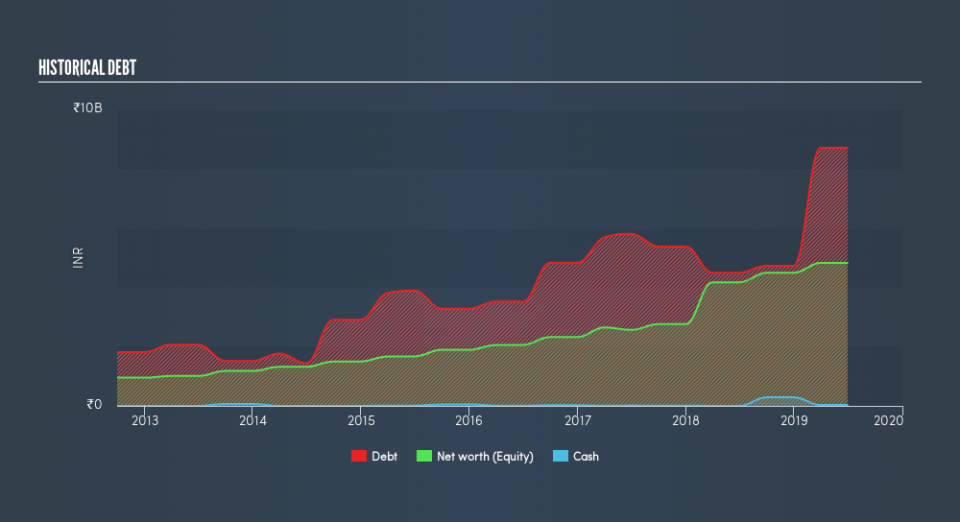Is Nitin Spinners (NSE:NITINSPIN) Using Too Much Debt?

Howard Marks put it nicely when he said that, rather than worrying about share price volatility, 'The possibility of permanent loss is the risk I worry about... and every practical investor I know worries about.' When we think about how risky a company is, we always like to look at its use of debt, since debt overload can lead to ruin. Importantly, Nitin Spinners Limited (NSE:NITINSPIN) does carry debt. But the more important question is: how much risk is that debt creating?
When Is Debt Dangerous?
Debt is a tool to help businesses grow, but if a business is incapable of paying off its lenders, then it exists at their mercy. Part and parcel of capitalism is the process of 'creative destruction' where failed businesses are mercilessly liquidated by their bankers. However, a more common (but still painful) scenario is that it has to raise new equity capital at a low price, thus permanently diluting shareholders. By replacing dilution, though, debt can be an extremely good tool for businesses that need capital to invest in growth at high rates of return. When we examine debt levels, we first consider both cash and debt levels, together.
View our latest analysis for Nitin Spinners
What Is Nitin Spinners's Debt?
You can click the graphic below for the historical numbers, but it shows that as of March 2019 Nitin Spinners had ₹8.70b of debt, an increase on ₹4.49b, over one year. Net debt is about the same, since the it doesn't have much cash.
How Strong Is Nitin Spinners's Balance Sheet?
The latest balance sheet data shows that Nitin Spinners had liabilities of ₹2.93b due within a year, and liabilities of ₹6.60b falling due after that. Offsetting this, it had ₹30.3m in cash and ₹1.21b in receivables that were due within 12 months. So its liabilities total ₹8.30b more than the combination of its cash and short-term receivables.
This deficit casts a shadow over the ₹2.92b company, like a colossus towering over mere mortals. So we'd watch its balance sheet closely, without a doubt At the end of the day, Nitin Spinners would probably need a major re-capitalization if its creditors were to demand repayment.
We use two main ratios to inform us about debt levels relative to earnings. The first is net debt divided by earnings before interest, tax, depreciation, and amortization (EBITDA), while the second is how many times its earnings before interest and tax (EBIT) covers its interest expense (or its interest cover, for short). This way, we consider both the absolute quantum of the debt, as well as the interest rates paid on it.
With a net debt to EBITDA ratio of 5.0, it's fair to say Nitin Spinners does have a significant amount of debt. But the good news is that it boasts fairly comforting interest cover of 3.9 times, suggesting it can responsibly service its obligations. However, one redeeming factor is that Nitin Spinners grew its EBIT at 15% over the last 12 months, boosting its ability to handle its debt. The balance sheet is clearly the area to focus on when you are analysing debt. But ultimately the future profitability of the business will decide if Nitin Spinners can strengthen its balance sheet over time. So if you want to see what the professionals think, you might find this free report on analyst profit forecasts to be interesting.
Finally, while the tax-man may adore accounting profits, lenders only accept cold hard cash. So the logical step is to look at the proportion of that EBIT that is matched by actual free cash flow. Over the last three years, Nitin Spinners saw substantial negative free cash flow, in total. While investors are no doubt expecting a reversal of that situation in due course, it clearly does mean its use of debt is more risky.
Our View
On the face of it, Nitin Spinners's conversion of EBIT to free cash flow left us tentative about the stock, and its level of total liabilities was no more enticing than the one empty restaurant on the busiest night of the year. But on the bright side, its EBIT growth rate is a good sign, and makes us more optimistic. After considering the datapoints discussed, we think Nitin Spinners has too much debt. While some investors love that sort of risky play, it's certainly not our cup of tea. Given our concerns about Nitin Spinners's debt levels, it seems only prudent to check if insiders have been ditching the stock.
If, after all that, you're more interested in a fast growing company with a rock-solid balance sheet, then check out our list of net cash growth stocks without delay.
We aim to bring you long-term focused research analysis driven by fundamental data. Note that our analysis may not factor in the latest price-sensitive company announcements or qualitative material.
If you spot an error that warrants correction, please contact the editor at editorial-team@simplywallst.com. This article by Simply Wall St is general in nature. It does not constitute a recommendation to buy or sell any stock, and does not take account of your objectives, or your financial situation. Simply Wall St has no position in the stocks mentioned. Thank you for reading.

